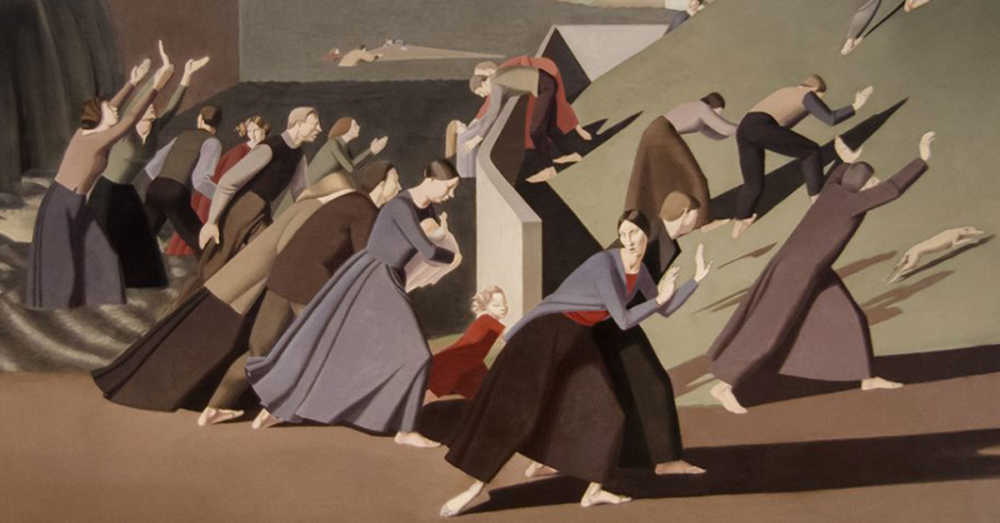We run our website the way we wished the whole internet worked: we provide high quality original content with no ads. We are funded solely by your direct support. Please consider supporting this project.

Is Your Church Promoting Tribalism?
It’s long been said that Sunday morning is the most segregated time of the week. Sadly, many have taught us that homogeneity is the way the church grows the fastest. But should we put up with this? In what follows, Greg lays out a biblical foundation for what he calls “reversing Babel.”
According to the biblical record, tribalism can be traced back to the infamous Tower of Babel. Several generations after the flood, humans were still living in one locale and had one common language and culture (Gen 11:1-2). Then someone came up with the brilliant idea that they should construct an enormous tower that would reach “to the heavens” in order to make a name for themselves and keep themselves unified (vss. 3-4).
The Lord saw what they were doing and said, “If as one people speaking the same language they have begun to do this, then nothing they plan to do will be impossible for them” (vs 5-6). What I hear the Lord saying is that if humans succeeded in erecting this idolatrous temple there would be no limit to the depth of evil they could sink to.
Theologically speaking, all the different phenotypic, cultural and national differences we see among diverse people groups today can be traced back to this divine judgment. Since all these people were entrapped in idolatry, it was inevitable that sooner or later some would try to get life from this distinctiveness of their tribe or nation. Tribalism, nationalism, and racism were born.
While people since Babel have had a tendency to exalt their human-centered, national uniqueness over others, God’s heart has always been to reverse Babel and bring nations together under him.
Isaiah prophesies of a day when “the mountain of the Lord’s temple will be established as the highest of the mountains” so that “all nations will stream to it” (2:2). He foresees a time when “all people” will behold “the glory of the Lord” (40:5) as they gather together at God’s “holy mountain” (56:7). This will be a time when “the Sovereign Lord will make righteousness and praise spring up before all nations” (61:11) as he gathers “people of all nations and languages” to “come and see my glory” and as he inspires “all people” to “come and bow down before” him (66:18, 23).
God’s “ways are not our ways,” (55:8-9) for our ways tend to be in line with Babel. It was true of ancient Israel, and it tends to be true of the Church today. Instead of attracting all others with our splendor, we repel them with our tribalistic superiority and self-righteousness. Fortunately, God’s ways always eventually triumph. And the one in whom they begin to triumph is Jesus Christ.
We get an idea of how central reversing Babel is to the Kingdom when we consider what happened on the first day the Church officially came into being—the day of Pentecost. Jesus had told his disciples he was going to leave them but that he would send the Holy Spirit to them. This promise was fulfilled 40 days later on the day of Pentecost. As 120 disciples were praying, the Holy Spirit came on them and they all “began to speak in other tongues as the Spirit enabled them” (Acts 2:1-4).
What’s particularly interesting about this episode is that there were people from many different countries visiting Jerusalem at this time, and they each heard the disciples speaking in their own native dialect (vs 6-12). The curse of Babel was being reversed. When the people inquired about what this meant, Peter explained that this was the fulfillment of the prophecy found in the book of Joel: “In the last days, God says, I will pour out my Spirit on all people” (vs 17).
This is the very first thing that happened when the Church was birthed! This passage teaches us that where the Spirit of God is present, where the reign of God is being established, where the Church is being the true Church—Babel will be in the process of being reversed. Where the Spirit is working, all the nationalistic walls that idolatrous humans have established will be losing all significance (Gal 3:28). Where the Spirit is working, the “one new humanity” that Christ died to bring about will be in the process of being manifested (Eph 2:14-16).
In other words, this passage reveals that reversing Babel is one of the most fundamental distinctive marks of the Kingdom. With his shed blood, Jesus “purchased for God members of every tribe and language and people and nation” (Rev 5:9). The Kingdom, therefore, is manifested whenever people are no longer defined by their Babel-originated tribe or nation, but only by their life-giving relationship with Jesus Christ and their belonging to God’s beloved community.
Category: Essays
Tags: Essay, Kingdom, New Humanity, Racism, Tribalism
Topics: Ethical, Cultural and Political Issues, The Church
Related Reading

The Point of the Book of Job
The point of the book of Job is to teach us that the mystery of evil is a mystery of a war-torn and unfathomably complex creation, not the mystery of God’s all-controlling will. Given how Christians are yet inclined to look for a divine reason behind catastrophes and personal tragedies, I think it’s a point…

Does God Have a Dark Side?
In the previous post, I argued that we ought to allow the incarnate and crucified Christ to redefine God for us rather than assume we know God ahead of time and then attempt to superimpose this understanding of God onto Christ. When we do this, I’ve argued, we arrive at the understanding that the essence…

The Church & Racism in America
Elias Schewel via Compfight Over the weekend, tapes were released that revealed some shocking racists statements attributed to the owner of the Los Angeles Clippers. President Obama has commented. Sports analysts have opined. Coaches and players in the NBA are understandably disgusted and overwhelmed by it all. What should the church say at a time like this?…

When God Abandoned God
On the cross, Jesus’ cried out, “Eli, Eli, lema sabachthani?” – which means, “My God, my God, why have you forsaken me? (Mt. 27:46). These are arguably the most shocking, beautiful, and profoundly revelatory words found in Scripture. The cry reveals that on Calvary, the all-holy Son of God experienced God-forsakenness as he bore the…

To My Offender
We’re happy to introduce you today to Brandon Andress. He is the author of AND THEN THE END WILL COME! and UNEARTHED: How Discovering the Kingdom of God Will Transform the Church and Change the World. He has served as an elder and teaching pastor at The Living Room Church in Columbus, Indiana. Brandon writes…

Responding to the Negative Fallout of Trump’s Election
Yesterday I suggested that we refrain from judging the motivations of brothers and sisters who voted for Donald Trump (see post). As the young lady I spoke with illustrates, a person could genuinely grieve over the negative implications Trump’s Presidency might have for certain people groups but nevertheless believe that there are considerations that outweigh these negative implications…
